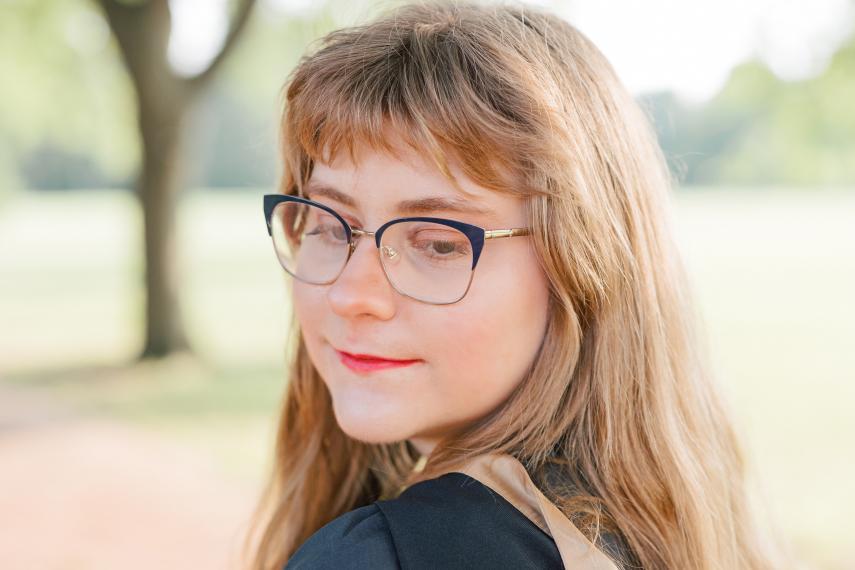Q&A With Victoria Leaker

Victoria Leaker (she/her) is a fifth-year student at the University of Guelph majoring in Theoretical Physics. Leaker has a strong interest in cultivating community: She’s currently acting Vice-President (Internal) of the Physics and Astronomy Club and conducting research as an Undergraduate Research Assistant in the lab of Dr. Eric Poisson. Next year, she’ll begin a master’s degree in Astrophysics and Gravitation with Poisson as her supervisor.
We spoke to Victoria about her Undergraduate Research Assistantships, her academic experiences, and her plans for next year.
You have tons of undergraduate research lab experience. What has your experience as a research assistant been like?
It’s been amazing, I’ve been lucky to have been supervised by some truly exceptional people and am very grateful for the opportunities that I’ve had at U of G. Research can be frustrating at times; Inevitably you get stuck and the amount of progress you’re making will slow, but it’s important to remind yourself that such a state is temporary. The whole point of research is that it’s totally okay to have no clue what you’re doing or feel lost. After all, that’s why you’re researching that topic!
How would you describe the research you are doing to someone who’s never heard of it?
I’m basically modelling stellar objects (things like neutron stars and other types of stars) as large, spherical fluids. We learn early on in physics that with any fluid, if you poke it or disturb it in some way, the fluid will move, and you’ll get oscillations (types of movements) throughout. In the case of stellar objects, the force of gravity can disturb these systems in such a way. I’m working with my supervisor to develop a model that allows us to study these oscillations at different points along the object’s interior.
Why did you decide to come to the University of Guelph?
I really like the atmosphere! Guelph is a relatively small campus and the class sizes, especially in upper years, are pretty scaled down in comparison to other universities. As an introvert, I was really attracted to the cozier atmosphere that this fostered. I also grew up around a lot of farmlands and like how in Guelph, we get the convenience of being in the city while living in the country. We’re surrounded by some truly beautiful wildlife.
How do your research assistantships tie into your goals for yourself and your career?
I’ve always been really interested in the field of astrophysics and my research assistantships have helped me to narrow down exactly what field of astrophysics I wanted to get into. They’ve also prepared me for the realities of what research is like, giving me a good basis for what to expect during my master’s. I now have an appreciation for how interconnected all different fields of physics are.
How have the skills you’ve gained from your Physics degree assisted you throughout your RAships?
Thanks to Dr. Mike Massa (a physics professor) and his push to implement more computation into the degree, I’ve become proficient with Python as a coding language. In physics, especially Theoretical Physics, computation is a huge part of the research you do as it allows you to model systems that may otherwise be difficult to study in a lab. As a result of my exposure to Python, I’ve been able to focus more on the research and less on the technical details of what I’m doing.
Has your network and community at the University been a factor in your academic and professional success so far?
Absolutely! The Physics department here at Guelph is truly exceptional I don’t think I’d be where I am today without all the support that my professors have given me. My friends have also been a huge driving factor in my academic and professional success so far. It helps to have a close network of people who you can goof around with after a long day and talk to when you’re in need of guidance.
Something to keep in mind: You’ll never get opportunities if you don’t ask or inquire about what ones are available to you.
You have been very involved in extracurriculars throughout your time here, including your current position as acting VP Internal of the Physics and Astronomy club. What advice would you give to fellow CEPS students to help them balance school, research placements, and extracurricular activities?
In terms of balancing school with extracurricular activities and research placements, my biggest advice would be come up with a schedule and stick to it. It can be difficult to do and may take some tweaking before you find something that works for you but once you do it makes a huge difference. While sleeping in can be great, sometimes waking up early means you have an extra couple of hours to indulge in your hobbies. Set one alarm for the time you want to wake up at; setting more than one will just encourage you to ignore the first and sleep in.
What’s next for you?
In addition to my master’s next year, I’m also an avid artist and want to continue cultivating my skills and improving my painting and drawing technique.